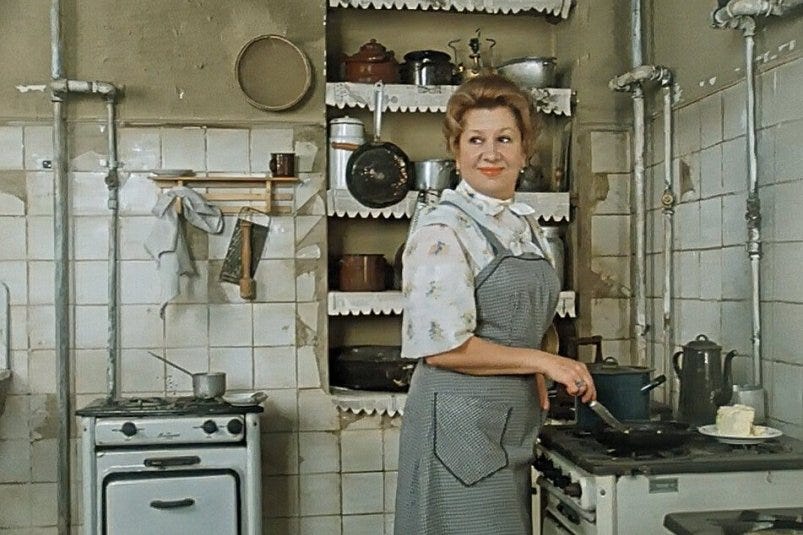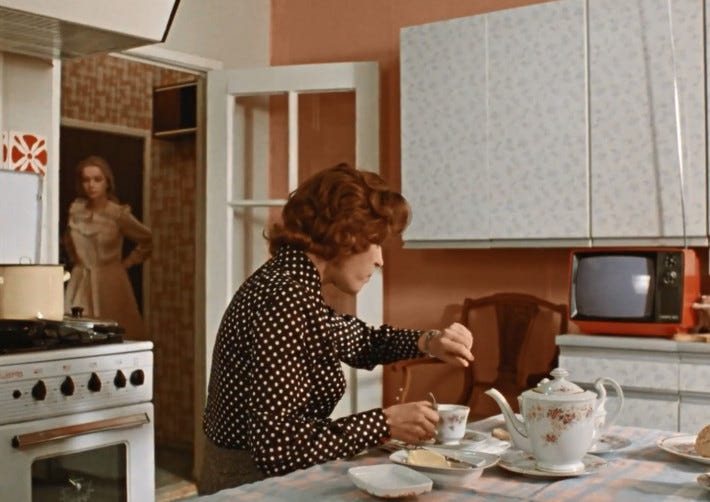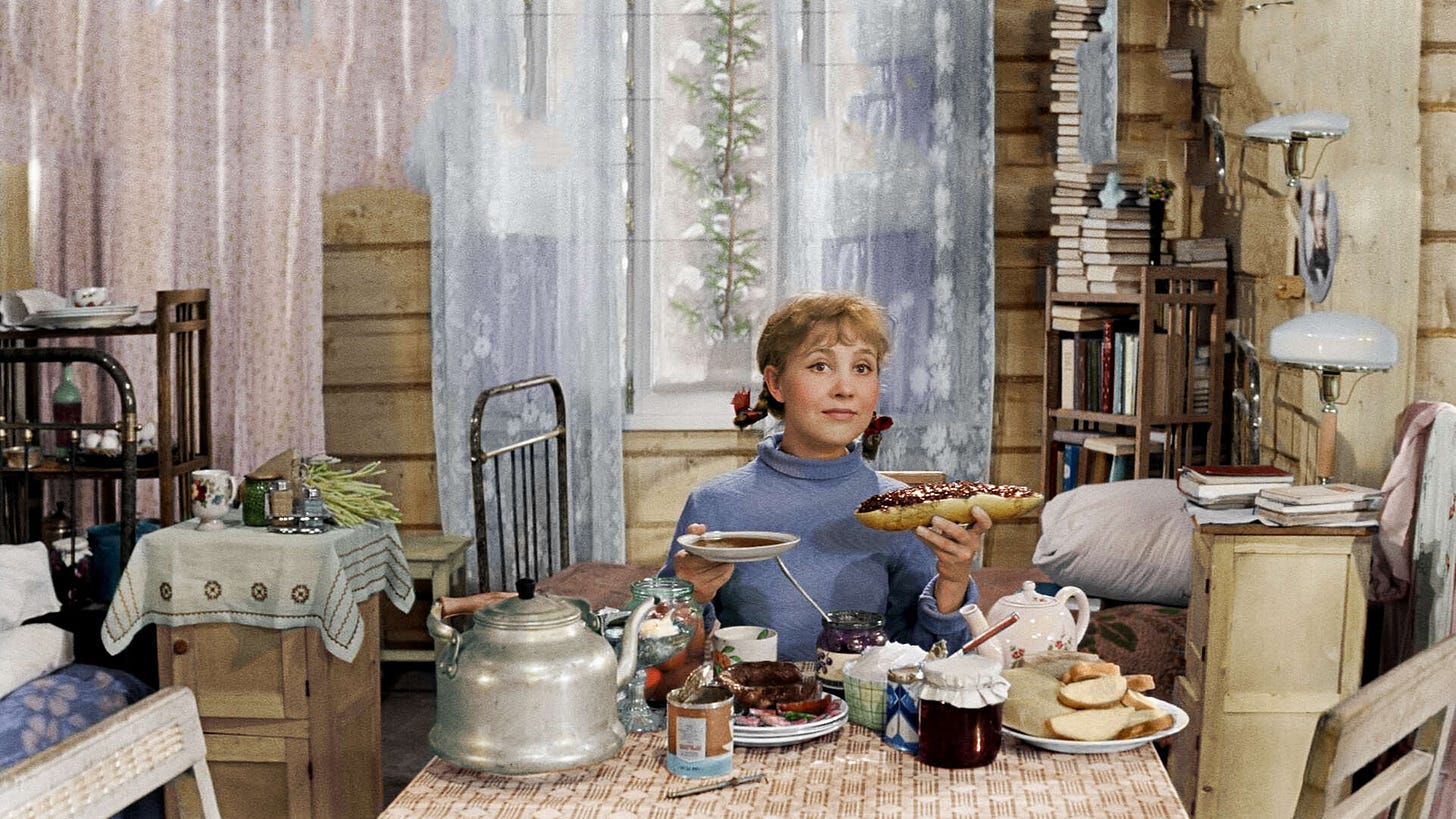Вечер добрый!
Давай послушаем самую прослушиваемую песню1 на просторах Интернета. Жми сюда. Услышав песню про хрущёвки, люди наверняка чувствуют одно и то же: toska for a carefree childhood2, a gentle sadness3, and a sense of closeness with people who have long been gone.
Под пронзительные строки о бережных и нежных4 хрущёвках люди показывали старые фотографии, на которых были запечатлены скромные семейные посиделки5, счастливые моменты детства и близкие, которых уже нет6.
Так <мне> хочется вернуться в то беззаботное детство хоть на минуточку. Посмотреть на бабушку молодую, на папу, на себя маленькую девочку.
How I wish to return, to that carefree childhood even for a moment. To see my young grandmother, my father, and myself, being a little girl.
Так сильно скучаю по бабушке и дедушке. Они были моим теплом и радостью, умели радоваться простому, окружали заботой и любовью. Хочется вернуться хотя бы на минуту в то время.
I miss my grandmother and grandfather so much. They were my warmth and joy, knew how to find happiness in the simple things, and surrounded me with care and love. How I wish to return to that time even for a moment.
If just a few years ago such simple, traditional male stage images seemed outdated and even boring, now the public longs for masculinity in its classic sense: a deep voice, understated style, tall stature, and broad shoulders.

Чувствовать ностальгию и светлую грусть по ушедшим дням7 — это нормально. The thing is, human perception works in such a way that the past always seems good and happy. Simply because everything about it is already known. А вот8 будущее и настоящее воспринимаются, как нечто опасное и тревожное9, так как будущие события предсказать невозможно, а uncertainty gives rise to fear.
Автор сумел подобрать слова10, that pull from memory associations with and forgotten days. “Кухни” [Kitchens] became the soundtrack of collective therapy, rehabilitating concepts such as small homeland, simplicity, and shared instead of individual.

I feel like we, millennials, recall our carefree childhood and the days spent with parents, some of whom are no longer around. Meanwhile, members of the Zoomer generation might romanticize the “kitchen” aesthetic: for them, it’s a protest against the artificiality and superficiality of social media. Perhaps, I’m wrong.
Ok, if you haven’t listened to the song yet, please, do it now. Click here. :)
Простишь меня за всё ли в одежде
Тихо плакать
Когда устанешь приходи
На кухни
В бережных и нежных хрущёвках
Хранилище надежд для потомков
Рассыпанная соль на клеёнке
Молоко на губах обсохло
Ведь всё могло быть неплохо
И всё могло быть неплохо
Всё могло быть
На этих кухнях
Радостны дни твои11
What do you think about the lyrics and melody? How does it feel after reading the Rus and Eng lyrics now? Has it rang a bell? (for those who read one of my recent newsletters about talks at a tea tables ;)
Exercise for the 1 commentary. Complete the sentences using the correct form of the words in brackets, add the prepositions if needed. Answers see here12.
Мне ______ вернуться в моё счастливое детство. (хотеть)
Так ______ посмотреть на старые фотографии и вспомнить всё. (хотеться)
Я люблю смотреть ___ (бабушка) молодую — какая она была красивая! (кто?)
Она часто думает ___ (себя) маленькую девочку с бантиками. (кто?)
Мы все хотим вернуться в прошлое хотя бы ___ одну минуту. (какой?)
Exercise for the 2 commentary. Complete the sentences using the correct form of the verbs in brackets. Answers see here13.
Я очень ______ по своей бабушке. Она всегда была доброй и ласковой. (скучать)
Мои дедушка и бабушка ______ моим теплом и радостью. (быть)
Они ______ радоваться самым простым вещам — прогулке, чаю с вареньем… (уметь)
Бабушка всегда ______ меня заботой и вниманием. (окружать)
Мне ______ снова оказаться в том времени, когда мы были вместе. (хотеться)

most-played song
беззаботному детству
светлую грусть
To the poignant lyrics about tender and gentle
capturing modest family gatherings
loved ones who are no longer here
for days gone
In contrast
perceived as something dangerous and unsettling
managed to choose words
Forgive me for everything in my clothes, (referring to all past experience, even dishonored)
Quietly weeping,
When you’re tired, come back home.
To the kitchens,
In the gentle, tender Khrushchyovkah,
Storehouses of hope for future generations,
Spilled salt on the oilcloth tablecloth, (This superstition appeared in Russia in the 17th century during riots and rebellions. At that time, salt was expensive, so it means if you spill salt, it will lead to an argument with the family members)
Milk dried on your lips. (to describe a situation where someone is in a state of maturity, experienced)
After all, everything could have been fine,
Everything could have been fine,
It all could have been…
In these kitchens,
Your days were joyful.
хочется
хочется
на бабушку
на себя
на одну
скучаю
были
умели
окружала
хочется




